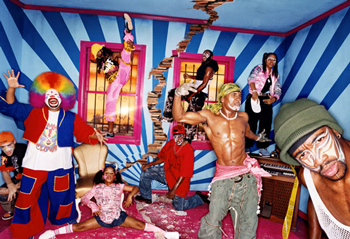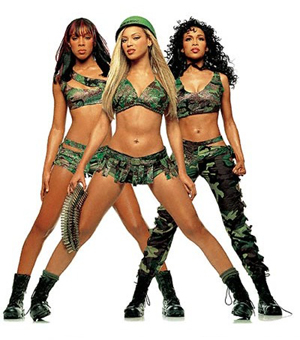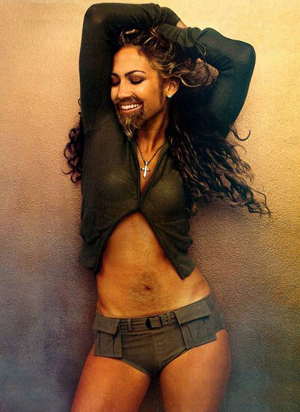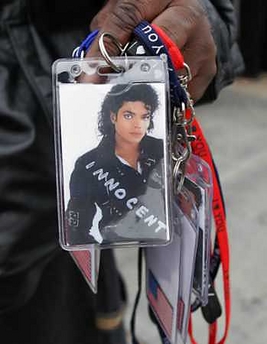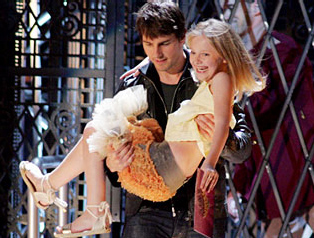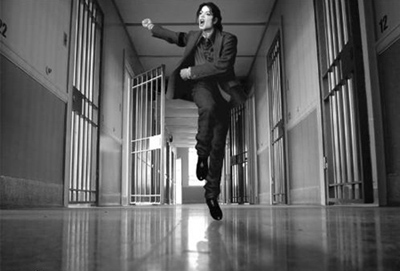CLOSE ENCOUNTERS OF THE THIRD REICH
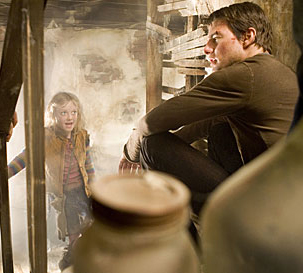
"So Tom, exactly how young do you like your women?"
Spoiler alert!
I knew that War of the Worlds would play like a mash-up of Spielberg movies. Perhaps he'd remix the hunt for Cruise in Minority Report with the reversed humanity of robots in AI over the constant drumbeat of terrified prey in Jurassic Park.
Little was I prepared last night to be slapped with hints of three entirely different Spielberg movies: Schindler's List and Saving Private Ryan and Amistad. No joke.
CLICK HERE TO CONTINUE READING...
Spielberg is an expert in showcasing evil. Whether it be snakes in Indiana Jones or government alien-nappers in E.T., he knows how to contrast the tension of the unknown with the thrill of close calls.
But when people were mauled by a T. Rex in Jurassic Park, that was just popcorn-chomping fun. Given that these aliens are even more fantastical and dehumanized than the dinosaurs, he could have let the audience have the same type of fun.
Instead, Spielberg manages to place the horror of human decimation here on the same plane as that in Schindler's List. The suspense from the flaming train in this film was eerily similar to the train that ominously pulls into Auschwitz.
That's because Spielberg's target here isn't our fantastical fears (aliens, Captain Hook) as much as our current fears. When Tom Cruise is covered with the ashes of vaporized humans and walls are plastered with pictures of missing people, the allusion to 9/11 is devoid of subtlety. The soldiers, the tanks, and the naive son who wants to fight the enemy remind us of the pointless chaos of our current war. The hundreds forced to abandon their home are reminiscent of refugees fleeing Rwanda. The people caught in the web of the alien's stomach look no different than victims of human trafficking.
Call me cuckoo, but Dakota Fanning -- who delivers a phenomenal child-acting performances -- does ask, in the beginning of the film, if they're fleeing from "the terrorists."
Spielberg's clearly got terrorism on his mind. After all, while filming this, he was in pre-production for his next movie about the assassination of Israeli athletes during the 1972 Munich Olympics (which will certainly push our current anti-Arab, anti-Palestinian sentiment to even more extremes).
(To his credit, the film includes a line that is a subtle swipe against our current occupation of Iraq.)
This is not to suggest that I was taking the movie too seriously or that I was having a miserable time. I had fun. But I felt guilty for having fun, as if I were laughing at Challenger explosion jokes.
Ultimately, I blame Spielberg for my unease -- his allusions to current tragedies felt cheap, at best.
But make no mistake about it: this movie is wildly entertaining. The alien invasion seems so real that I felt forced to tremble in the shoes of a man escaping the apocalypse. The fact that the evil comes in the form of ALF-driven tripods, as opposed to, say, North Koreans seems beside the point.
Having said that, the masterful cinematography and CGI effects were nearly cancelled out by the painfully disappointing conclusion. I hate those schmaltzy, unrealistic happy endings ubiquitous in nearly every Spielberg film.
Spielberg does evil so well that he needs to do just one film where evil prevails.


 too black for blacks?
too black for blacks?